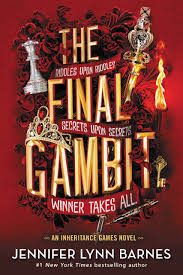
The Final Gambit (The Inheritance Games)
CHAPTER 51
by Barnes, Jennifer LynnEve, accompanied by Avery and Xander, arrives at Rebecca’s home to meet Mallory, Rebecca’s mother and Eve’s grandmother. The tension is palpable as Rebecca’s red, chapped hands hint at the stress and emotional turmoil within the household. The living room is immaculately clean, suggesting either Rebecca’s efforts to cope or Mallory’s obsessive control. Mallory’s fixation on Eve is immediate, as she dismisses Avery’s presence and lavishes attention on Eve, comparing her to her late daughter, Emily. The scene underscores Mallory’s unresolved grief and her unsettling possessiveness.
Mallory’s behavior grows increasingly unsettling as she insists Eve call her “Mom” and reminisces about Emily, whom she saw as an extension of herself. Eve, seeking answers about her origins, gently probes Mallory about Toby’s father, Liam. Mallory’s reaction to Liam’s name is fraught with tension, revealing a painful past. Rebecca, caught between her mother’s instability and her own distress, remains silent but visibly shaken. The dynamic highlights the family’s fractured relationships and the weight of unspoken truths.
Eve persists in her questioning, asking why Liam left, but Mallory’s response is evasive and emotionally charged. The arrival of an unexpected visitor interrupts the tense conversation, prompting Oren to take defensive measures. Avery deduces that the security team anticipates another threatening package, linking the visit to the ongoing danger surrounding Eve. The abrupt shift in focus heightens the sense of impending crisis, leaving the unresolved family drama simmering in the background.
The chapter culminates in a blend of emotional confrontation and external threat. Mallory’s unresolved trauma and Rebecca’s silent suffering paint a poignant picture of a family haunted by loss and secrecy. Meanwhile, the looming danger outside the house adds a layer of urgency, suggesting that Eve’s quest for answers may be overshadowed by more immediate perils. The interplay of personal and external conflicts sets the stage for further tension and revelation.
FAQs
1. How does the author use physical descriptions to convey Rebecca’s emotional state in this chapter?
Answer:
The author employs vivid physical details to mirror Rebecca’s inner turmoil. Her “red and chapped” hands with damaged nailbeds and knuckles suggest compulsive cleaning (likely due to stress), while her “ruby-red hair falling into her face” and downward gaze illustrate withdrawal. The fairy-tale metaphor (“something fairy-tale beautiful about the pain”) contrasts her external beauty with internal suffering. These descriptions intensify when Rebecca “sucks a breath in around her teeth” during her mother’s unsettling interaction with Eve, physically manifesting her distress without dialogue.2. Analyze the significance of Mallory’s reaction to Eve calling her “Mom.” How does this moment reveal her psychological state?
Answer:
Mallory’s visceral response to being called “Mom” exposes her unresolved grief and delusional replacement of her deceased daughter Emily with Eve. The text notes her “dead places inside… seized with life,” implying she’s projecting maternal feelings onto Eve to fill an emotional void. This is compounded when she earlier states Emily “was me,” showing she views daughters as extensions of herself. Her sharp dismissal of Rebecca’s concerns (“infantilize me”) and immediate compliance with Eve’s request after the term of endearment reveal both her fragility and manipulative tendencies.3. What does the snow globe symbolism suggest about the Laughlin household dynamics?
Answer:
The “polished until they gleamed” snow globes represent Mallory’s obsessive control and desire to preserve an idealized past. Like snow globes—static, encapsulated worlds—she attempts to freeze time, scrubbing everything “again and again” to maintain perfection, mirroring her fantasy of Emily’s unchanging memory. This connects to Rebecca’s damaged hands, implying coerced participation in this ritual. The globes’ fragility parallels Mallory’s mental state, while their artificial tranquility contrasts the tense reality, much like how Mallory’s maternal performance with Eve clashes with her harshness toward Rebecca.4. How does the chapter use mathematical references (“scale of one to pi”) to foreshadow events?
Answer:
Xander’s “scale of one to pi” question (where pi ≈ 3.14) becomes a subtle foreshadowing device. Rebecca’s response—pressing “three fingers” (value 3)—indicates maximum crisis, since 3 exceeds pi’s decimal. This mathematically implies the situation is worse than imaginable, hinting at Mallory’s escalating instability. Later, this mirrors when Eve’s manipulation reaches a “3”-level intensity by calling Mallory “Mom” to extract information. The motif reinforces that emotions here defy rational measurement, just as pi’s infinite decimals suggest uncontrollable escalation.5. Evaluate how Eve’s investigative approach contrasts with Avery’s observational role in this scene.
Answer:
Eve actively drives revelations through strategic empathy (calling Mallory “Mom”) and direct questioning about Toby’s father, while Avery remains an observer, noting body language and symbolism (cleaning, snow globes). Eve’s tactics border on manipulation—using Mallory’s grief—whereas Avery’s shoulder bump for Rebecca shows passive support. This dichotomy highlights their roles: Eve as the biological heir uncovering secrets, Avery as the outsider analyzing dynamics. The tension peaks when Avery recognizes Eve’s “cruel” effectiveness in obtaining answers denied to Rebecca, underscoring their competing approaches to truth-seeking.
Quotes
1. “On a scale of one to pi, how bad is it?”
This mathematically playful yet ominous question from Xander sets the tense tone for the chapter, using the irrational number pi to imply that the situation may be worse than a standard scale can measure.
2. “You have to learn to take what you want—and never, ever let someone take what you don’t want to give.”
Mallory’s harsh life philosophy reveals her controlling nature and the toxic mindset she’s imposed on her family, showing how her grief has twisted into possessiveness.
3. “You’re strong. Like me. Like Emily was.”
This loaded compliment from Mallory to Eve demonstrates her disturbing tendency to project her deceased daughter’s identity onto Eve, blurring generational boundaries in her grief.
4. “His name was Liam.”
This pivotal revelation about Toby’s father’s identity represents a major plot development in the mystery surrounding Eve’s origins, delivered with haunting simplicity.
5. “He left. Liam left.”
The repetition in Mallory’s response about Liam’s departure suggests deep, unprocessed trauma, hinting there’s more to this story while showing how she copes with abandonment through emotional detachment.
